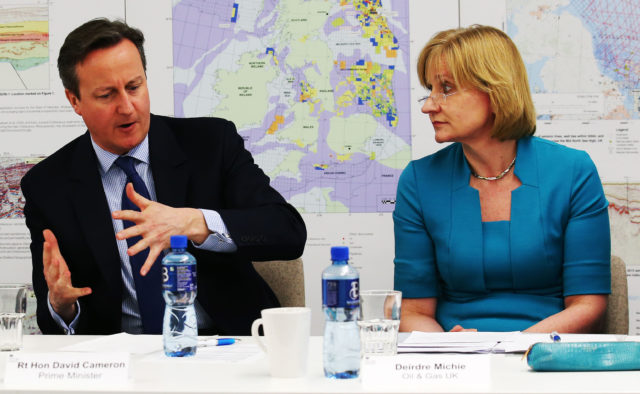Oil and gas production in the North Sea is forecast to grow by 5% in 2018, however low levels of drilling mean the outlook for future years is “much more uncertain”.
The industry body Oil and Gas UK published its latest Business Outlook report, showing production in 2018 could rise to the equivalent of 620 million to 640 million barrels of oil, up from 517 million in 2014.
Rising oil prices meant revenues from the sector increased from £16 billion to £21 billion last year, making this the first year since 2013 that the UK Continental Shelf (UKCS) generated enough cash from sales to cover expenditure.
But the report highlighted a “serious concern” about the lack of drilling in the North Sea , with 94 wells started in 2017, the lowest number since 1973.
“Development drilling has fallen by around 45% in just two years, which is a particularly worrying trend for the future health of the basin,” the report warned.
While Oil and Gas UK said a 5% increase in production was expected in 2018, it stressed the future outlook for the sector was “heavily dependent on new fields coming onstream as planned and continued effective management of production efficiency on existing assets”.
The report went on: “The production outlook for the basin is much more uncertain post-2019. The lack of new project approvals and the recent low level of development drilling in the last few years, means it is likely that the UKCS will return to a position of production decline during the early 2020s.”
While the number of jobs supported by the industry fell from 315,000 in 2016 to 300,000 last year, the 4% drop was the lowest for three years “suggesting that companies are beginning to stabilise after tumultuous periods of restructure”.

And a survey of Oil and Gas UK members found more than half (56%) of companies expect to expand their workforce in 2018, with just 6% anticipating further staff cuts.
In 2017 the UKCS produced the equivalent of 598 million barrels of oil – the same amount as it had in 2016.
A small increase in production had been anticipated but the “unexpected closure of the Forties Pipeline System due to a technical issue in the last few weeks of the year” led to a dip in production in December.
Oil and Gas UK chief executive Deirdre Michie said: “Our sector is leaner, more efficient and more optimistic than it has been in recent years and 2018 looks set to be a better year.”
The downturn in the sector has made the UK oil industry “better equipped to tackle the ongoing challenge of maximising production for the longer term and boosting profitability in the supply chain but without increasing overall project costs or damaging competitiveness”, she added.
While Ms Michie insisted the UKCS was “one of the most attractive mature basins in the world in which to do business”, she also stated that many parts of the supply chain “are still struggling with the impact of the downturn and have yet to benefit from any upturn in activity”.
She said: “It’s vital that we keep driving fresh thinking, innovative approaches and efficiency efforts.
“The short-term outlook for our sector is more positive with new projects and new entrants bringing new life to the basin, but there are undoubtedly longer-term challenges.
“We need more exploration if we are to get close to recovering the up to nine billion barrels of yet-to-find hydrocarbons on the UKCS, matched by a continuing focus on improving recovery from existing fields.
“The investment decisions we make today are key to how much we produce in the years to come.
“Oil and gas remain a vital part of the UK economy and will form most of our primary energy needs for many years to come.
“As we move to a lower-carbon economy, the UK needs to meet as much of its domestic demand for oil and gas from indigenous resources as possible.
“This will ensure security of supply, generate revenue for the Exchequer, support the supply chain and sustain hundreds of thousands of highly-skilled UK jobs.
“The energy market is changing but we will remain relevant for many decades to come.”
A spokesman for the Department of Business and Energy said: “We welcome the industry’s confidence at the prospect of new investment decisions for developments in the North Sea. This Government’s commitment to the sector has directly contributed to making the North Sea globally competitive and more attractive to new investment opportunities.
“The oil and gas sector will continue to play a significant role for the UK’s economic and energy security in 2018, supporting more than 300,000 jobs and providing the UK with 46% of its gas supply needs.
“We are also working with the sector to build on the £2.3 billion worth of UK government support through our modern Industrial Strategy.”
Scotland’s energy minister Paul Wheelhouse said: “The oil and gas sector remains a key component of our energy system and our economy.
“These figures, particularly in growth in investment and a further 5% increase forecast for production in 2018, are therefore very welcome.
“While this will boost the supply chain, companies are still finding conditions tough at this time, so we will continue to press UK ministers to exercise their reserve powers to do more to stimulate exploration and attract fresh investment.”